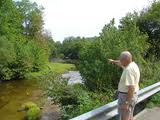What killed Dunkard Creek in September of 2009? Was it dissolved inorganic solids from mining operations or was it different dissolved inorganic solids from drilling operations, or from mine methane degassing? Was it golden algae from Texas or Oklahoma? These questions are discussed in a recent New York Times article.
. . . . .
Two years after Dunkard Creek suffered one of the worst fish kills ever in West Virginia or Pennsylvania, the reason for the chemical changes that caused it remain a mystery. U.S. EPA has ended its investigation and pointed the finger at a local coal mine, Blacksville No. 2, and entered a multimillion-dollar settlement with the owner, CONSOL Energy Inc. But the lead EPA biologist on the case has challenged that idea, saying that the most likely explanation for the fish kill involves the environmental effects of Marcellus Shale drilling.
. . . . .
A few days before the consent agreement was signed and announced this year, Reynolds wrote to a colleague that Marcellus operations on the creek are the most likely way for the fish-killing “golden algae” to spread. “There is water that is removed from these streams for use in Marcellus fracking,” he wrote. “There is always some amount of water that gets left in the tank and hoses that then gets put into other streams. By far, this is the most likely way that GA [golden algae] will be moved around.” Lou Reynolds, a biologist at EPA, said that Dunkard should be “OFF LIMITS” for gas companies looking to withdraw millions of gallons used to frack Marcellus wells.
. . . . .
Officially, CONSOL says it did not cause the fish kill, despite paying millions of dollars in fines and agreeing to build the treatment plant. And EPA says it never assigned blame. EPA spokesman David Sternberg said the agency has not alleged that mine drainage is the sole cause of the fish kill. He pointed to a previous statement from EPA that said, “The complaint in this matter alleges that discharges of high amounts of chloride and TDS from CONSOL’s Blacksville 2 and Loveridge mining operations in the Monongahela River Basin contributed to severe impairment of aquatic life and conditions favorable for golden algae to thrive in Dunkard Creek.”
. . . . .
The WV Department of Natural Resources has developed a Restoration Plan. It was presented in a public forum in Morgantown and is now available on the WV-DNR web-site.
. . . . .
More recently, Pennsylvania has brought suit against CONSOL for damages to that portion of Dunkard Creek in PA. This legal action is describe in the Pittsburgh Post-Gazette, among other news sources. CONSOL has submitted a request that this suit be moved from the Pennsylvania courts to the U.S. District Court, according to the Observer-Reporter.

